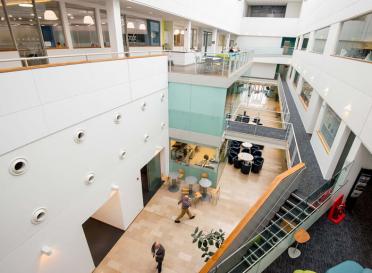Life at Earlham Institute
We believe that our people are our greatest asset, and we want you to have the freedom to achieve your very best work here.
You will need to download, save and complete a copy of the application form using Microsoft Word or prepare a copy of your CV that contains all the information requested in the application form.
ApplyApplications are invited for a Postdoctoral Research Scientist to join the Laboratory of Jose De Vega at the Earlham Institute, based in Norwich, UK.
Background:
The De Vega's group analyses crop diversity panels and families using bioinformatic methods. Our goal is to understand better adaptation and tolerance in populations to incorporate novel diversity into the genetic background of elite varieties. Our expertise is in bioinformatics, with a focus on population structure analysis, selection scanning, comparative genomics, association mapping, and transcriptomic gene expression analysis. We collaborate with gene banks, genetic researchers, and pre-breeding institutions from the UK and overseas. We also collaborate with agroindustry partners as part of our impact delivery.
The role:
You will contribute to EI's core research program on non-model crop species by developing computational methods and analyses. Your focus will be on two projects in the group:
Chromosomal rearrangements and large structural variations are increasingly recognized as we transition from single to multiple assembled reference genomes and from short-read to long-read sequencing technology. This genetic diversity is expected to play a crucial role in developing vital adaptive traits in the future. However, identifying these events and their functional impacts is challenging.
You will be working on tuning new tools and methods developed in the Decoding Biodiversity research program to understand the underlying genomic processes and the extent of this variation in two allopolyploid species, banana and Miscanthus. Your tasks will include developing long-read genome assemblies, annotating their genomes, and using them to build pangenomes. Additionally, you will be exploring pangenome graphs to identify introgressions and CNVs and linking this information to phenotype information using association mapping.
We are developing approaches to efficiently identify somatic and epigenetic variation and characterize its functional consequences in clonal sets of crop species, with a focus on bananas. This work will enable future crop improvements by developing new ways to remove deleterious variants and incorporate beneficial genetic diversity in clonal lines, which will improve resilience and productivity in clonally propagated crops.
You will use Oxford Nanopore Technologies datasets to characterise DNA methylation and structural variants and reconstruct pangenome graphs to discover and functionally characterise structural variants. We are particularly interested in fruit-related and fungal resistance phenotypes.
The ideal candidate:
The successful candidate will have a PhD (or working towards completion) in genomics, genetics, bioinformatics, or a related field.
This post will require a highly motivated and experienced bioinformatician, with strong core scientific skills, demonstrated experience in plant or animal genetics and genome evolution, and evidence of leading research projects to a successful conclusion.
The position is fully computational and involves analysing crop populations using pan-genome references.
Training will be provided in population structure analysis, selection scanning, comparative genomics, association mapping, and transcriptomic gene expression analysis. It is essential that the ideal candidate has initiative and a desire to learn, innovate, contribute, and add novel analysis perspectives to the projects, and to move out of their comfort zone.
Additional information:
Salary on appointment will be within the range £36,720 to £39,750 per annum depending on qualifications and experience. This is a full-time post with an ideal start date of January 2025.
This role meets the criteria for a visa application, and we encourage all qualified candidates to apply. Please contact the Human Resources Team if you have any questions regarding your application or visa options.
As a Disability Confident employer, we guarantee to offer an interview to all disabled applicants who meet the essential criteria for this vacancy.
The closing date for applications will be 24 November 2024.

We believe that our people are our greatest asset, and we want you to have the freedom to achieve your very best work here.

Norwich is a city of culture, with its rich history of art and writing, as well as a city of science - hosting some of the leading centres for life science research in the world.

The behaviours and communication skills we expect from candidates.